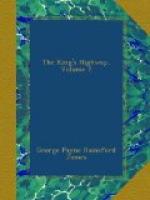He was soon relieved, however, by the return of the Duke, who had sent the letter, but who continued evidently anxious and thoughtful during the whole of dinner. Wilton was also a little disturbed, and showed himself rather silent and retiring than otherwise. But before dinner was over—for such meals were long protracted in those days—one of the servants brought a note to the Duke, who, begging pardon for so far violating all proprieties, opened, read it, and, while the cloud vanished from his countenance, placed it on the salver again, saying to the servant, “Take that to Mr. Brown.”
The note was in the hand of Lord Byerdale, and to the following effect:—
“Mydear lord duke,
“Your grace’s
attachment to the government is far too
well known to be affected
by anything that such a person as
Peter Cook could say.
I permitted our dear young friend
Wilton to tell you what the
man had mentioned, more as a
mark of our full confidence
than anything else. But I doubt
not that he will forbear to
repeat the calumny in court; and
if he does, it will receive
no attention. Go out of town, then,
whenever you think fit, and
to whatsoever place you please,
feeling quite sure that in
Wilton you have a strenuous
advocate, and a sincere friend
in
“Your
grace’s most humble and
“most
obedient servant,
“Byerdale.”
CHAPTER XXXIII.
For nearly ten days after the events which we have recorded in the thirtieth chapter of this volume, and while the principal part of the events were taking place of which we have just spoken, Lord Sherbrooke remained absent from London. Knowing the circumstances in which he was placed, Wilton felt anxious lest the delay of his return might attract the attention of Lord Byerdale, and lead him to suspect some evil. No suspicion, however, seemed to cross the mind of the Earl, who was more accustomed than Wilton knew to find his son absent without knowing where he was, or how employed.
At length, however, one morning Lord Sherbrooke made his appearance again; and Wilton saw that he was on perfect good terms with his father, who never quarrelled with his vices, or interfered with his pursuits, when there was any veil of decency thrown over the one, or the Earl’s own views were not openly opposed by the other.
When Wilton entered the room where the father and son were seated at breakfast, he found Lord Sherbrooke descanting learnedly upon the fancy of damask table-cloths and napkins. He vowed that his father was behind all the world, especially the world of France, and that it was absolutely necessary, in order to make himself like other men of station and fashion, that he should have his coronet and cipher embroidered with gold in the corners, and his arms, in the same manner, made conspicuous in the centre.




